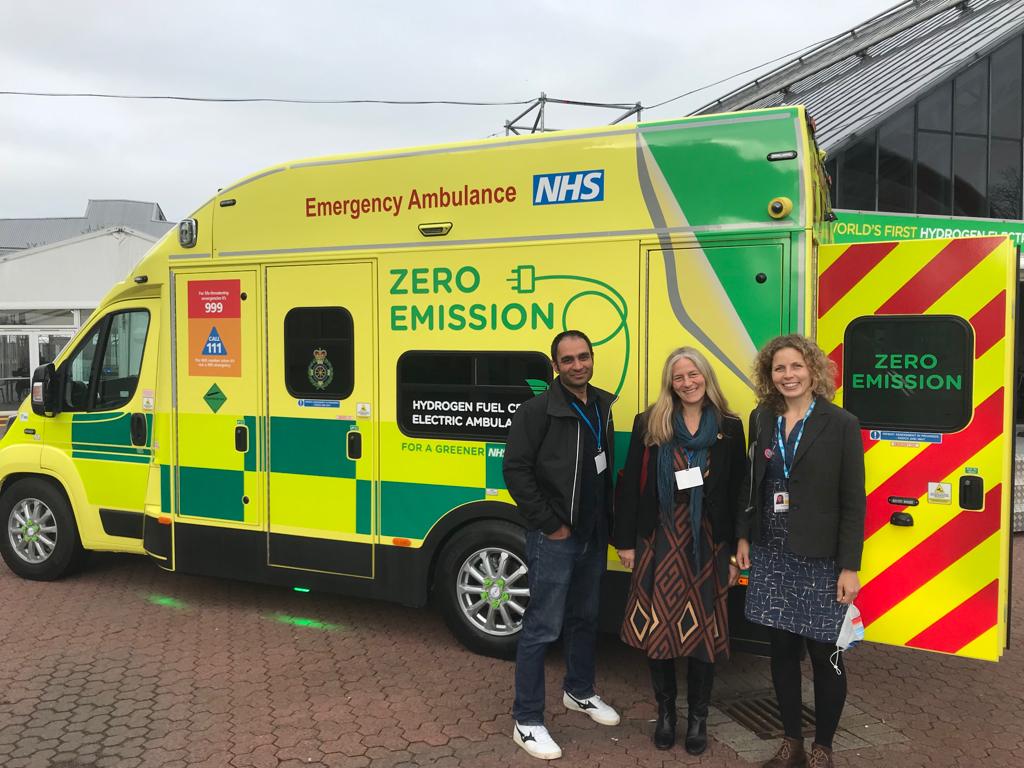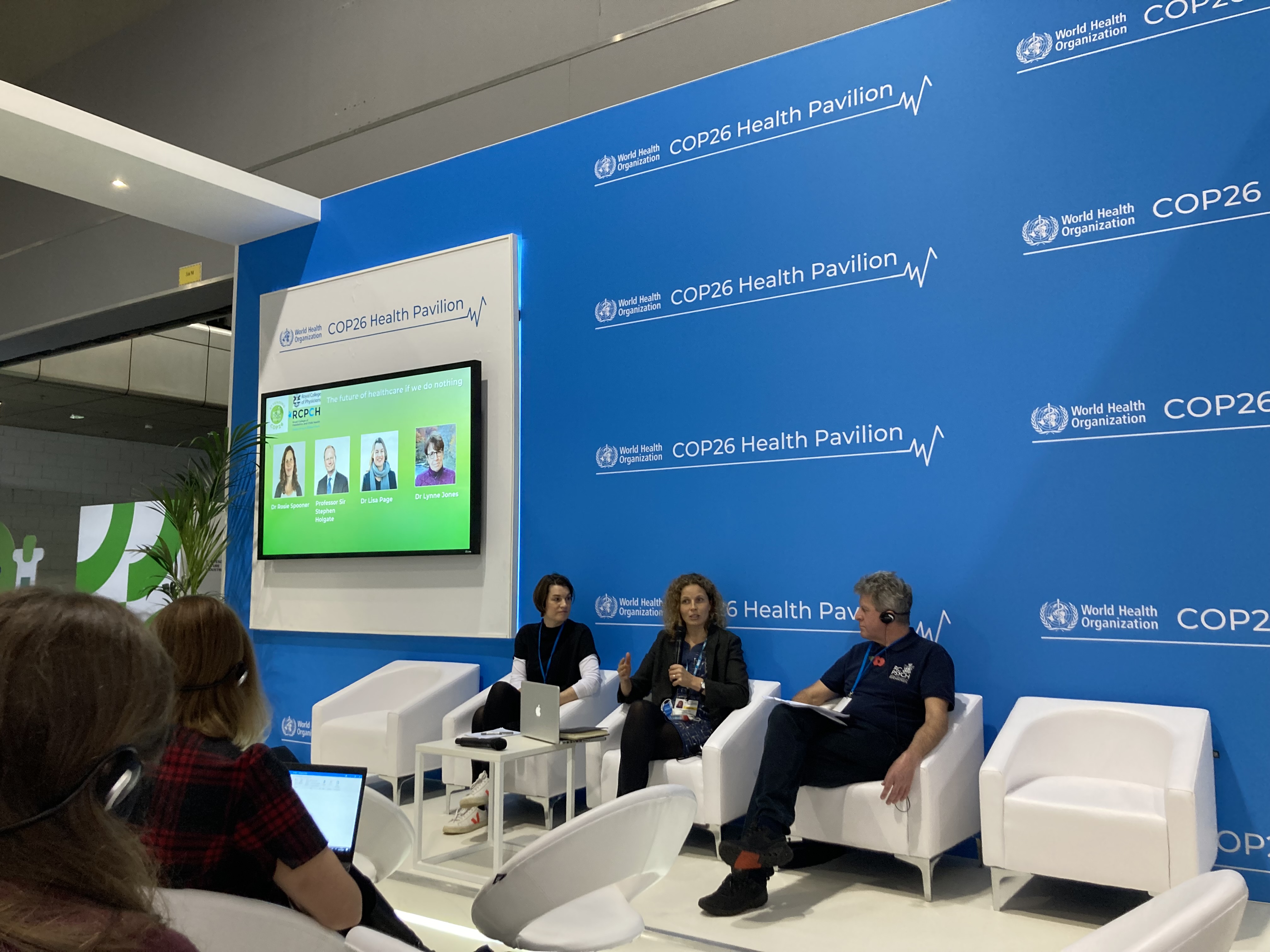
CSH@COP26 Day 10: Transport
Today’s COP theme was transport, a major contributor to climate-related health impacts and more directly to air pollution. Active transport is a classic health-environment win-win given the co-benefits of active travel for human health and for reducing pollution and improving green space access and conservation.
CSH delegates Director Rachel Stancliffe, Professor Mahmood Bhutta, and Dr Rosie Spooner attended a UK government-hosted session on the switch to sustainable transport, which included Sir Patrick Vallance, who had just taken a photo with Nick Watts at the low-emissions ambulance and is supporting sustainable healthcare. It was noted that transportation accounts for nearly one-third of Greater Manchester's emissions. Encouraging active transportation modes could have a large impact considering just under 250 million car journeys of less than one kilometer are taken each year. The session included examples from Utrecht and other cities where active travel has been prioritised.
It was disappointing that many of the sessions today seemed focused on technical fixes and were pushing electric vehicles as the main green transport solution. We know that these are dependent on minerals such as cobalt for their batteries which are in very short supply and are being mined mostly in Africa under very bad labour conditions.
Following the publication of the draft COP closing statement, many countries pushed for the 1.5 degree limit needed to maintain a planet suitable for healthy people, although most commitments so far are heading for a rise of 2.4C. We were encouraged that there were good references to key demands around the right to health, indigenous rights and other key demands in there. At a health meeting, the consensus in the health community was to use our voice to support, enforce and uplift these statements by pushing countries to keep these in the final declaration, so much of the rest of the day was spent going around the country stands and finding the appropriate people we could talk to about health. We also supported the proposal to add the right to a healthy environment to the full list.
Rosie and I had spoken yesterday on the WHO stand to people from Malawi and Kenya who were representing health and today Mood and I met together with them and another health person from Sao Tome and Principe along with representatives from Global Climate and Health Alliance and the International Federation of Medical Students (both organisations are very active at COP). We learnt about the importance of educating informal community health workers along with introducing sustainability into the formal medical curriculum and training. IFMSA and CSH agreed to share learning objectives and frameworks for curriculum change. The result of this meeting was the start of an African coalition for sustainable healthcare.
I attended a session on the important voice that public health associations could have in both the science and discussions around the climate crisis. The session was led by The International Association of National Public Health Institutes (IANPHI), an international umbrella organisation of national public health institutes lead by Duncan Selbie, previously Chief Exec of PH England.
I would like to mention here the amazing input to the health voice at COP from medical students, coordinated by IFMSA. The clarity and energy from them that I have observed is fantastic. Partly via their lobbying of the Egyptian delegation, who will host COP next year, it seems very likely that health will have a separate day and be set up as a constituency, which will really make a difference for making health more central to the proceedings and ensuring that countries all have health representatives at COP.
Helen Ross (Chair of the Special Interest Group on Sustainability at the Faculty of Public Health, England) has also been pushing to set up a HINGO, a new type of health collaborative group at COP modelled on the existing RINGOs (research interest groups).
As always, these large meetings emphasise the importance of coordinating and networks where people can learn what’s already happening and join people up.
The last session I attended was about ‘the future of healthcare if we do nothing.’ Chaired by Adrian James, President of RCPsych, who gave a mention of CSH as having set much of the groundwork for sustainable healthcare, and featuring Dr Rosie Spooner as one of the speakers, and Lisa Page, Sustainability Fellow at RCPsych, it included presentations on the existing physical and mental health affects of climate change (air pollution, heat, floods, conflict and migrants, eco-anxiety) and how these will be much worse in future if we do not succeed in stopping devastating climate breakdown. Rosie spoke on the vulnerability of children, what healthcare professionals can do, including the urgency of advocacy now. Use your voice and represent the vulnerable who are not here today.

Author
Rachel Stancliffe, Founder and Director of the Centre for Sustainable Healthcare
How CSH can support the transition to net zero healthcare:
Since 2008 the Centre for Sustainable Healthcare has engaged healthcare professionals, health systems, and the wider community to understand the connections between health and environment and reduce healthcare’s resource footprint. Guided by the four principles of sustainable clinical practice (prevention; patient empowerment and self care; lean systems; and low carbon alternatives) our programmes equip healthcare professionals and organisations with methods and metrics for sustainable models of care:
- Sustainable Specialties Programme
- Carbon Footprinting and Triple Bottom Line Analysis
- Education and Training
- Sustainability in Quality Improvement
- The Green Ward Competition
- Green Space for Health
- Sustainable Healthcare Peer Networks
Stay up to date with health news from COP26
Through the representation of 10 members of our network, the Centre for Sustainable Healthcare (CSH) is attending the Blue Zone negotiations and presidency programme events as an official observer. To increase transparency and feedback to the health community throughout the COP26 summit, CSH is publishing a daily recap blog summarising the latest developments, health implications, and potential solutions. These blogs are linked from our CSH@COP26 page.

